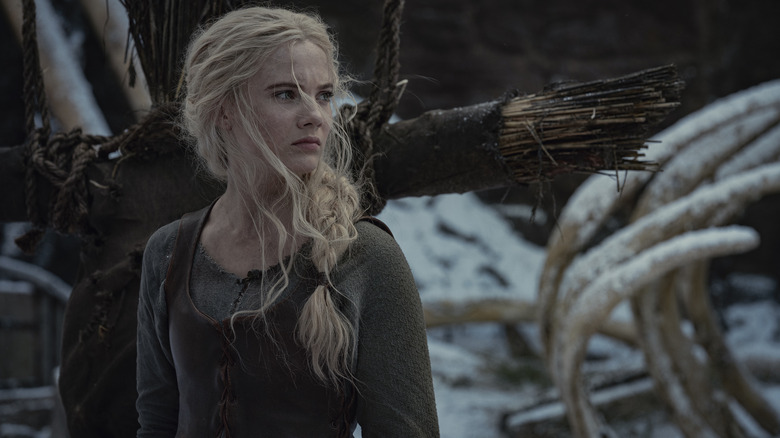
The Netflix fantasy series "The Witcher," based on a series of novels and short stories by Polish author Andrzej Sapkowski, is a complex and winding tale about heroes forced to face their destiny, even when the challenges seem insurmountable. The show's first season confused some viewers, following multiple timelines before bringing it all together for the finale. Thankfully, this season is more straightforward, continuing along with a single narrative instead of trying to weave together several at once. Season 1 introduced viewers to the four core protagonists, Geralt, the witcher (Henry Cavill), Jaskier, the bard (Joey Batey), the mage Yennefer (Anya Chalotra), and princess Ciri (Freya Allan), and taught us about the world itself, rich in high fantasy, politics, and prophecy.
The end of the first season saw the monster-hunting Geralt finally united with his child of surprise, Ciri. The princess is wanted by many, as she is not only heir to the city of Cintra, but she has incredible untapped magical potential. Season 2 promised a more mature Geralt, but in truth, the entire series grew up a bit. There's still plenty of swearing, humor, and monster fighting, but the show has also started engaging with heavier themes like identity, parenthood, and trauma.
If you haven't seen "The Witcher" season 2 yet, go check out our spoiler-free review. This one's for the seasoned veterans who want to dig deeper into the seasons' themes and most powerful moments.
Spoilers for season 2 of "The Witcher" after the cut.
This Is Ciri's Story Now
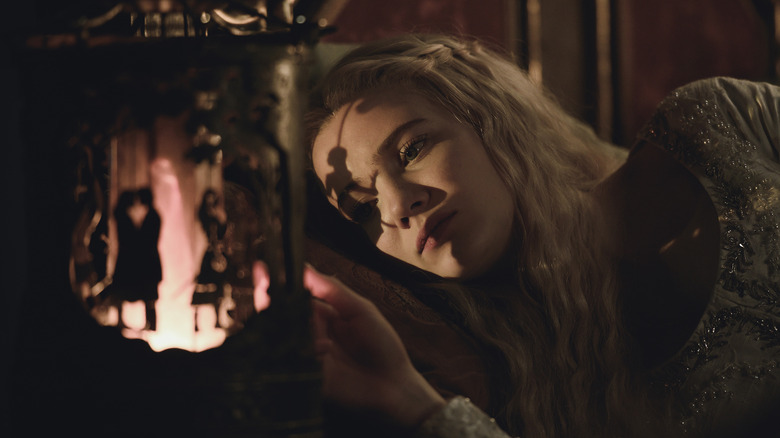
Season 1 belonged to Geralt and Yennefer, but season 2 is all about Ciri. The young princess turns out to be the prophesied "Child of Elder Blood," with the power to open doors between worlds within her. Remember the monolith that split open in season 1? That was because of Ciri's "scream," a magical ability that can shake the very fabric of reality. Ciri is the descendant of Lara Dorren, an Elven woman who was the last known carrier of Elder blood, a mutant gene created by the Elves to develop unstoppable mages. Elder blood is also used to create new Witchers, and Ciri wants to try the process herself before Geralt shuts her down.
Magic in "The Witcher" requires sacrifice, whether it's forbidden magic or the more mundane kind. Witchers must go through a painful transformation ritual that kills many of them before the magic holds, while mages who seek to do big magic must give something of themselves. Ciri's magic is different, drawing from an ancient well of power, but it may turn out that others must pay her sacrifice. After all, the "Child of Elder Blood" is supposed to bring about the Continent's version of the apocalypse.
Ciri's arc in season 2 had the potential to tread trope-y "chosen one" ground and put her on a pedestal, but instead, the series took a more nuanced route. Like another famous teenage hero, Ciri is burdened with both great power and great responsibility. She will change the face of the world, whether she likes it or not, but it's going to be up to her what kind of change that will be. While there are many forces trying to capture and control the young princess, the series has thankfully given her plenty of agency to make her own choices. It's refreshing and ideal from a writing standpoint, but it does mean that the fate of the universe is dependent on the whims of a teenager. Now that's scary.
Bad Times At Kaer Morhen
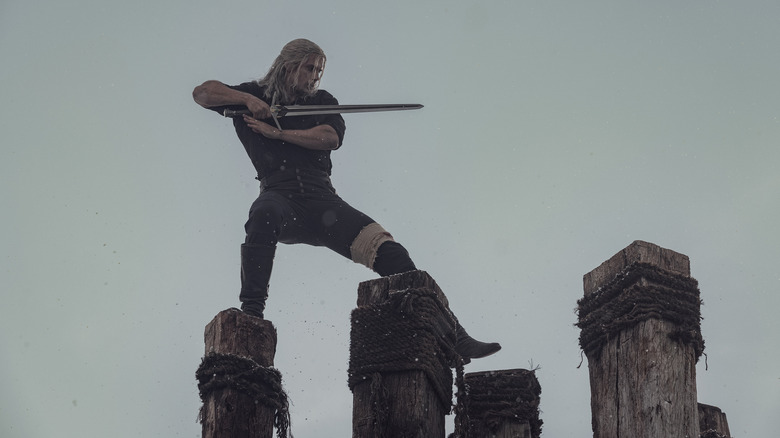
Much of season 2 of "The Witcher" takes place at Kaer Morhen, a mountain fortress where Geralt grew up and was trained in the ways of being a witcher. He takes Ciri there to begin her own training, and we are introduced to a number of other witchers. Among them is Vesemir (Kim Bodnia), who served as Geralt's surrogate father and claimed him as a child of surprise. Kaer Morhen is one of the few locations the series has stayed in for more than a single episode and getting to know its labyrinthine, rat-infested halls was like discovering a new home, for audiences as well as Ciri.
The time at Kaer Morhen helps us understand Geralt a bit better, which is good since he's still a man of few words. He definitely does a lot less grunting and swearing this season, but don't expect any long monologues or exposition. Instead, we learn about Geralt through the other witchers that he grew up with, and from his interactions with Ciri.
One of the season's best moments takes place at Kaer Morhen, following Ciri as she tries to prove herself to the witchers. She's a princess (and a girl), so they try to convince her she will never be tough enough to join their ranks. Instead, she puts herself through their training gauntlet over and over, ignoring her bleeding, bruised body to show them she has what it takes. On top of showing the witchers that she's tenacious and driven, she endears herself to the audience. Her stubborn fortitude is a lot like Geralt's, making them even more like father and daughter.
One Effed Up Found Family
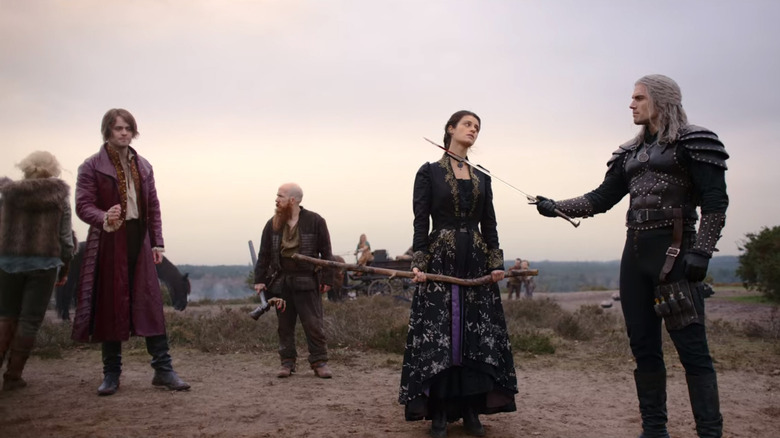
Season 2 gets dark. A whole town of dead babies dark. So it's good that there's a bit of humor, most of it derived from the interpersonal relationships between Geralt, Yennefer, and Jaskier. There's a lot of mutual distrust and bad blood between the trio, but they're united in their desire to protect Ciri and potentially avert the apocalyptic Wild Hunt. The chemistry between the actors is fantastic, and I could watch an entire series of the three of them just bickering. In the fourth and fifth episodes, "Redanian Intelligence" and "Turn Your Back," we were treated to a Jaskier and Yennefer team-up. The two insult one another constantly, yet they make a great team. There's something about the warmth between them despite their mutual hatred that is hard to explain but is joyous to watch. To prepare for their bickering, Chalotra and Batey apparently sent one another insults via text message and their slightly silly dedication shows.
Ciri is Geralt's child of surprise, so it's no real shock that he's grown and become more of a father figure this season. A bit more surprising is Yennifer's maternal turn. She spent the back half of season 1 trying to regain her fertility and have a baby, but she always seemed to want a child for selfish reasons. After getting to know Ciri, she decides she would give up anything to protect the girl, even her own life. In turn, she learns to care for someone else and develops those motherly feelings for her. Yennefer and Geralt will likely never have a healthy romantic relationship, but they can at least play nice for the sake of their magical adopted daughter.
As for Jaskier? He can be the cool uncle.
The World Grows
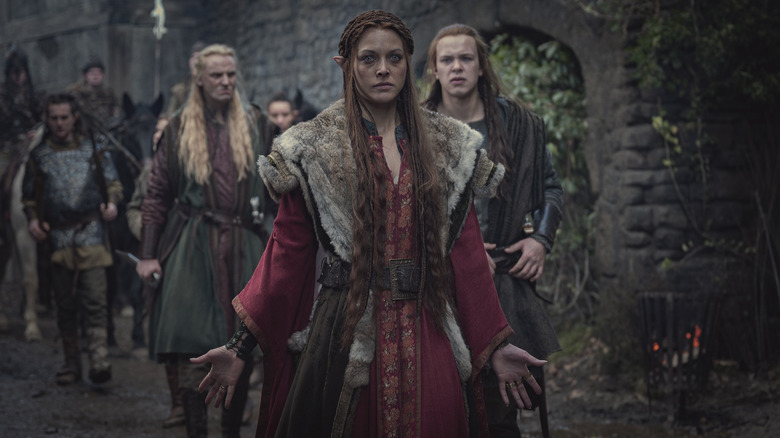
Just as Geralt, Yennefer, and co. mature in season 2, so do the world's sociopolitical conflicts. Season 1 reduced Nilfgaard to a marching army of conquerors reminiscent of the Necromongers from "The Chronicles of Riddick," but this season we finally got to understand the struggle for power between Fringilla (Mimi Ndiweni) and Cahir (Eamon Farren). This struggle leads the Elves, led by Francesca (Mecia Simson), to question their allegiance to Nilfgaard. After Francesca gives birth to the first full-blooded Elf born in centuries, she has a total change of heart. Instead of going to war against the North alongside Nilfgaard, she wants to take her people to try and start anew. Fringilla has the baby killed, forcing Francesca to retaliate by killing all of the infants in Redanian City.
The killing of Francesca's daughter was ordered by the White Flame himself, the religious leader of Nilfgaard. At the end of the season, his identity is finally revealed, and we learn that he's Ciri's biological father. That's going to seriously complicate things in season 3, and provide plenty of conflict between Ciri's father by blood and her father by law of surprise.
There are moments where "The Witcher" season 2 feels like it's stretching itself a little too thin. While the story arcs with the Elves and Nilfgaard provide greater world-building and enrich the story, some other subplots get lost in the shuffle. There's trouble at the mage's school where Yennefer and Triss (Anna Shaffer) trained, there's the "fire-f***er" who's after Ciri, and there's some nonsense going on with Djikstra (Graham McTavish). Each of these bits feels tangential to the overall story and theme of season 2, which is a shame because there are interesting moments within each. If "The Witcher" season 2 had 10 episodes instead of 8, maybe those subplots could have been fleshed out as well as the rest of the story. Then again, maybe they're just giving us a tiny taste of what's to come in season 3.
Fate Vs. Free Will
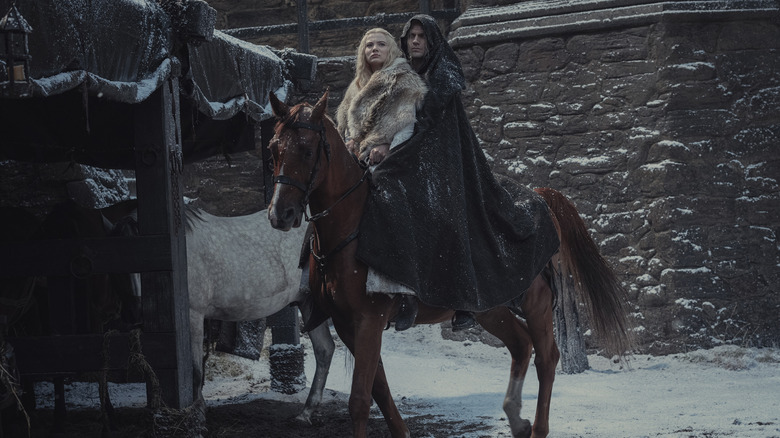
Season 2 of "The Witcher" improved upon its shaky first season in magnificent ways, providing deeper character arcs and in-world lore. It also started playing with larger themes as the characters grow into themselves and viewers get more comfortable with the world. Season 3 will be even bigger and better, and now has the sound foundation of its previous two seasons to stand on.
Throughout the series, the characters have rallied against their predestined fates and the rules the world places upon them. Yennifer and Geralt have both refused to let "destiny" control them, and now they're passing that same stubborn ferocity onto Ciri. In season 3, it will be up to this troublesome trio and their faithful cohorts to try and create a better future instead of the horrifying, apocalyptic one prophesied in the ancient texts. The big battle will be between fate and free will, and we'll have to wait and see if being obstinate can work in the face of destiny.
Read this next: Single-Season '80s Sci-Fi And Fantasy Shows That Deserve A Second Shot
The post The Witcher Season 2 Spoiler Review: How Do You Outrun Your Destiny? appeared first on /Film.
from /Film https://ift.tt/33Tlmdf
via IFTTT
Comments
Post a Comment